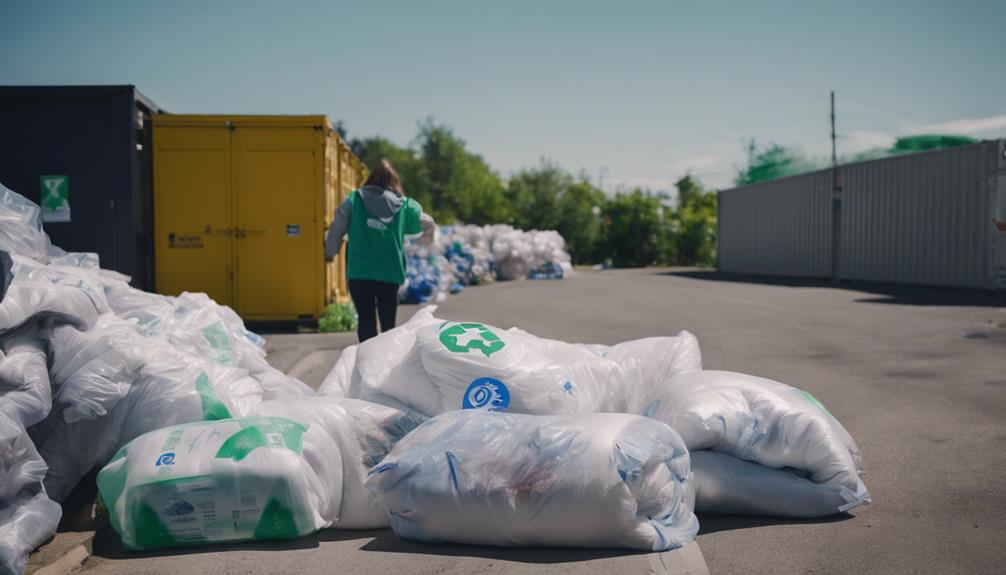Down comforters could develop unpleasant odors as a result of incorrect washing, natural scents from the genuine down filling, or potential mold growth, often indicated by a wet dog smell. Accumulation of dust and dirt in soiled goose feathers might cause a musty odor, underscoring the significance of proper care. Clean and fluffy feathers provide a fresh and pleasant aroma, while neglected ones could give off an overwhelming stench. Learn about appropriate drying techniques, the advantages of regular fluffing, and utilizing duvet covers for safeguarding. Keep in mind, preserving a fresh comforter requires exploring various methods.
Key Takeaways
- Improper care leads to odors in down comforters.
- Regular fluffing and proper drying prevent smells.
- Use duvet covers for protection against odors.
- Sun exposure reduces musty odors and bacteria.
- Professional cleaning every 3-5 years is recommended.
Reasons for Down Comforter Odors
Improper washing and drying methods can cause down comforters to develop unpleasant odors. When down comforters aren't properly dried, moisture can get trapped inside, leading to a wet dog odor. This smell is a sign that mold growth may be occurring within the comforter. Additionally, using the wrong detergent or fabric softener can contribute to these unpleasant odors lingering in the fabric. Even down comforters with real down filling can develop a slight natural odor that becomes more intense if not cared for correctly.
To avoid these issues, it's important to follow the proper washing guidelines for down comforters. Make sure the comforter is completely dry before storing it to prevent any moisture buildup. Regular cleaning and airing out of the comforter can also help prevent and eliminate odors. By taking these steps, you can make sure that your down comforter stays fresh and free from any unwanted smells.
Impact of Dirty Goose Feathers

Dirty goose feathers in down comforters can greatly contribute to unpleasant odors. When these feathers are dirty, they can harbor dust, dirt, and other particles that create a musty smell. Proper care of goose down comforters is essential to prevent these odor issues. Regular cleaning and maintenance, including washing and airing out the comforter, are vital steps in controlling and eliminating unwanted smells.
To understand the impact of dirty goose feathers on the overall smell of a down comforter, let's take a look at the following table:
| Cleanliness of Goose Feathers | Smell of Down Comforter |
|---|---|
| Clean and Well-Maintained | Fresh and Pleasant |
| Mildly Dirty | Slight Musty Odor |
| Moderately Dirty | Noticeable Unpleasant Smell |
| Very Dirty | Strong and Unpleasant Odor |
| Neglected for Long Periods | Overpowering Stench |
Ensuring that the goose feathers in your down comforter are kept clean and well-cared for can have a significant impact on the overall freshness and scent of the bedding.
Proper Drying Techniques
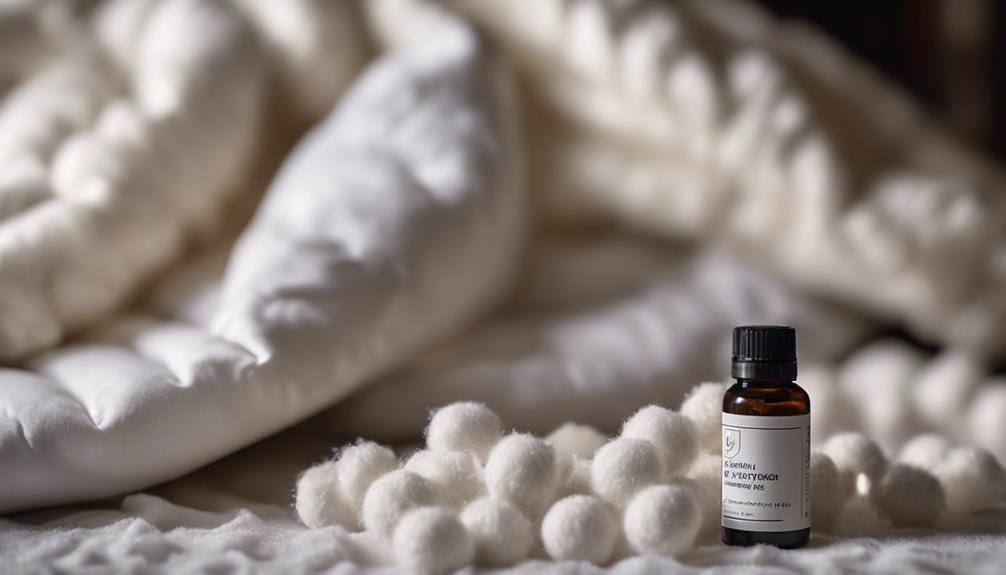
Properly drying a down comforter is essential to maintain freshness and prevent musty odors.
To dry a down comforter effectively, use low heat cycles in the dryer along with a few big bath towels. This helps absorb moisture and speed up the drying process without damaging the delicate feathers inside the comforter.
Adding tennis balls or sneakers in the final dry cycle can also help fluff the comforter and prevent clumping. Avoid using fabric softeners as they can coat the feathers and affect their fluffiness.
If possible, air drying the comforter outside under the sun is an excellent way to guarantee thorough drying and eliminate any remaining odors.
Benefits of Regular Fluffing
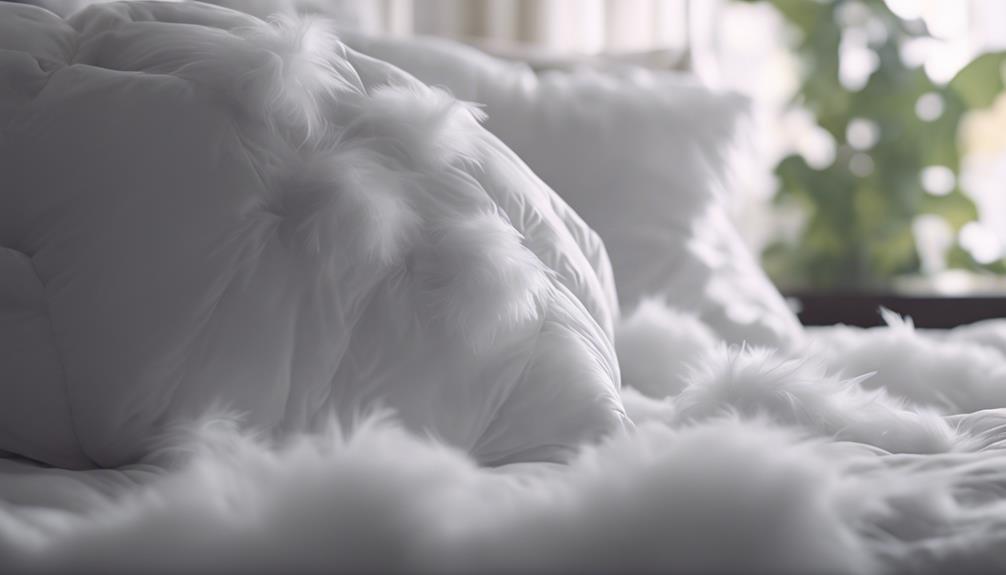
Regularly fluffing your down comforter helps maintain its loft, insulation properties, and overall coziness. Fluffing redistributes the down filling, preventing clumping and ensuring even warmth distribution.
To fluff your comforter, you can periodically shake it out and plump it up by hand. If your comforter is machine washable, make sure to wash it with a small amount of mild detergent and a few clean tennis balls to help fluff the down. Adding half a cup of white vinegar during the rinse cycle can also help remove any lingering odors.
When drying your comforter, use a dryer on low heat with a few dryer balls or clean tennis balls to keep the down evenly distributed. Make sure that the comforter is thoroughly dry to prevent mildew growth.
Using Duvet Covers for Protection

Duvet covers serve as a protective shield for down comforters, preventing dirt, spills, and unwanted odors from seeping into the bedding. They offer a convenient way to maintain cleanliness by being easily removable and washable.
Additionally, duvet covers come in various styles and materials, allowing for customization of your bedding while ensuring longevity and protection for your down comforter.
Covering for Odor Prevention
To maintain the freshness of down comforters and prevent odors, using duvet covers as a protective barrier is essential. Duvet covers act as a shield, preventing direct exposure to dirt and oils. They help keep the comforter clean, reducing the need for frequent washing that can lead to odors.
Easily removable and washable, duvet covers are convenient for maintaining a fresh sleeping environment. By using duvet covers, you can extend the lifespan of your comforter by protecting it from everyday wear and tear. Investing in high-quality duvet covers not only enhances the appearance of your bedding but also ensures your down comforter smells fresh for a longer time.
- Duvet covers act as a protective barrier for down comforters, preventing direct exposure to dirt and oils.
- They help maintain the cleanliness of the comforter and reduce the frequency of washing, which can lead to odors.
- Duvet covers are easily removable and washable, making them convenient for maintaining a fresh and odor-free sleeping environment.
- Using duvet covers can extend the lifespan of down comforters by shielding them from everyday wear and tear.
- Investing in high-quality duvet covers can enhance the overall appearance of the bedding while keeping the down comforter smelling fresh.
Washing Convenience and Care
When using duvet covers as a protective barrier for down comforters, the guarantee of washing and care is greatly enhanced.
Duvet covers act as a shield, reducing the frequency of washing the actual down comforter. The fabric of the duvet cover is easily removable and washable, making maintenance a breeze.
When it's laundry time, simply toss the duvet cover into the washing machine along with your regular wash cycle. This protects the down comforter from dirt and stains, extending its lifespan.
Choosing a high-quality duvet cover provides better protection for your down comforter. The variety of designs and materials available also allows for personalization and style in bedding, enhancing both convenience and aesthetics.
Style Enhancement and Variety
Enhancing our bedroom's decor and protecting our down comforter, duvet covers offer a versatile way to elevate our style while maintaining cleanliness. Duvet covers can protect down comforters from dust, dirt, and spills, extending their lifespan. They come in various styles, patterns, and colors, allowing for easy style changes and decor updates.
Duvet covers are removable and machine washable, making them convenient for maintaining cleanliness. Using a duvet cover can reduce the need for frequent washing of the down comforter itself. They provide an extra layer of insulation and can add a layer of softness for added comfort. Remember, wash your bedding regularly to keep everything fresh and cozy.
Cleaning the Comforter Every Few Years
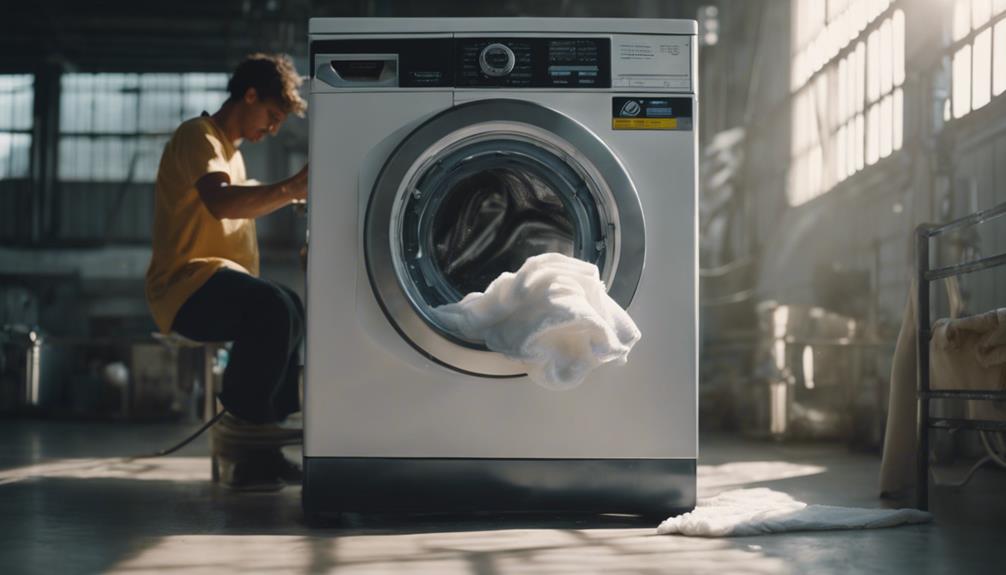
Periodically cleaning down comforters is important for maintaining their quality and freshness. Over time, dirt, dust, and allergens can accumulate in the comforter, leading to a musty or moldy smell. To combat this, it's vital to clean your down comforter every few years.
Most down comforters can be washed in large capacity washing machines at home. However, it's essential to follow the manufacturer's instructions for the best results. Using mild detergent and adding a couple of bath towels to help balance the load can prevent the delicate down filling from clumping.
For those hesitant to wash their comforter at home, professional cleaning services can provide specialized care to ensure thorough cleaning without damaging the comforter. By regularly washing your down comforter, you can extend its lifespan and enjoy a fresh and cozy sleeping experience for years to come.
Airing Out and Sun Exposure

When it comes to keeping our down comforters smelling fresh, airing them out and exposing them to sunlight are key techniques.
Airing out the comforter outside allows fresh air to circulate and remove trapped smells, while sun exposure can effectively reduce musty or wet dog-like odors by drying out lingering moisture.
Hanging the comforter in direct sunlight for a few hours can help refresh the fabric and break down odor-causing bacteria, maintaining a pleasant scent over time.
Odor Elimination Methods
Airing out your down comforter outdoors can effectively eliminate odors by allowing fresh air to circulate through the fabric. Here are some methods for odor elimination:
- Sun Exposure: Hanging the comforter under direct sunlight for a few hours can aid in reducing odors and promoting a cleaner scent.
- Proper Ventilation: Ensuring good airflow can prevent the development of mold or mildew that causes unpleasant odors.
- Bacteria Removal: Sun exposure can effectively kill bacteria and remove musty smells from the comforter.
- Cleanliness Maintenance: Regularly airing out the comforter helps maintain its cleanliness and freshness.
- Preventing Musty Smells: Proper ventilation and sun exposure can prevent the comforter from smelling like wet dog.
Benefits of Sunlight
To enhance the freshness and cleanliness of your down comforter, harnessing the benefits of sunlight through airing out and sun exposure can be a practical and effective method. Sunlight helps eliminate odors, naturally freshening and deodorizing the comforter.
The UV rays from the sun also play an essential role in killing bacteria, aiding in removing musty smells that may linger in the comforter. By airing out the comforter in sunlight, you can reduce moisture, thereby preventing the growth of mildew.
Embracing sun exposure as a way to freshen your down comforter isn't only cost-effective but also eco-friendly, making it a sustainable choice for keeping your bedding clean and pleasant.
Using Fabric Fresheners

Fabric fresheners offer a convenient way to temporarily mask odors in down comforters. When dealing with smells like wet dog or the need to freshen up between washings, fabric fresheners can come in handy. Here are some key points to keep in mind when using fabric fresheners on your down comforter:
- They provide a quick solution for freshening up the comforter between washings.
- Fabric fresheners work by neutralizing and eliminating unpleasant odors.
- Easy to use, simply spray them directly onto the comforter.
- While they can improve the scent, they aren't a long-term solution for eliminating odors.
- Using fabric fresheners like Febreze can help keep your down comforter smelling fresh and clean in a pinch.
Professional Cleaning Tips
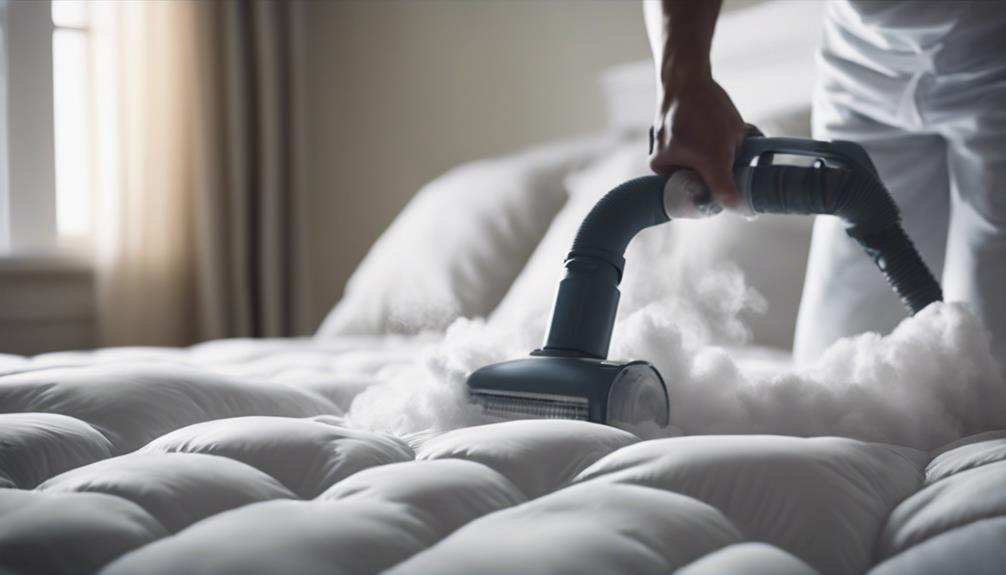
When it comes to maintaining the freshness and quality of down comforters, seeking professional cleaning every 3-5 years is highly recommended. Professional cleaning services, such as dry cleaners, have specialized equipment that can effectively remove odors from down comforters.
Home washing methods may sometimes damage these comforters due to their size and filling, making professional help a safer choice for odor removal. If DIY cleaning methods fail to eliminate odors, it's advisable to seek professional assistance.
Regular professional laundering not only helps in odor removal but also guarantees the longevity and freshness of down comforters. By entrusting the cleaning of down comforters to professionals every few years, you can enjoy a clean and fresh bedding experience without worrying about damaging these delicate items.
Frequently Asked Questions
Why Does My Down Comforter Smell Weird?
When down comforters smell weird, it's likely due to moisture causing mold and fungus growth. This can create a strong wet dog odor that affects the comforter's condition and your well-being.
To tackle this issue, air dry the comforter outside in the sun to eliminate odors. Fragrance sprays offer a temporary fix, but washing with vinegar and detergent is recommended for a long-term solution.
Neglecting the problem can lead to lasting damage and persistent unpleasant smells.
How Do I Make My Down Comforter Not Smell?
To prevent a smelly down comforter, we recommend proper care techniques.
Air dry it outside to reduce trapped moisture. Washing with vinegar and mild detergent can remove odors. Adding tennis shoes in the wash helps guarantee thorough cleaning.
Make sure thorough drying with low heat cycles or sun drying to avoid musty smells. Fragrance sprays offer temporary relief, but long-term freshness comes from good cleaning habits.
Follow these tips for a fresh-smelling comforter!
Does a Down Comforter Stink When Wet?
When wet, down comforters can develop a musty smell due to moisture getting trapped, creating a breeding ground for mildew.
Proper drying methods are essential to prevent this odor. Incomplete drying can lead to lingering unpleasant scents.
Promptly addressing wetness and ensuring thorough drying can help prevent down comforters from stinking.
Does Goose Down Have a Smell?
Goose down itself doesn't have a smell; it's natural and odorless. The odor in down comforters often results from improper cleaning, drying, or storage. Maintaining and cleaning comforters properly can prevent any unwanted smells.
Washing them correctly with suitable products and methods will keep them fresh. To maintain freshness, airing them out regularly and using protective covers are helpful.
Can Down Comforters Cause Asthma Symptoms to Worsen?
Many people wonder if down comforters can exacerbate asthma symptoms. Despite misconceptions, down comforters may not necessarily worsen asthma. Regular cleaning, use of hypoallergenic covers, and proper ventilation can minimize the risk. It’s crucial to consult a medical professional for personalized advice on managing down comforters and asthma.
Conclusion
To sum up, keeping your down comforter clean and fresh is essential for a good night's sleep. Just like how we need regular showers to feel our best, our bedding also needs proper care.
By following the tips mentioned earlier, you can make certain that your down comforter stays odor-free and cozy for years to come. Remember, a little maintenance goes a long way in preserving the comfort and quality of your bedding.





